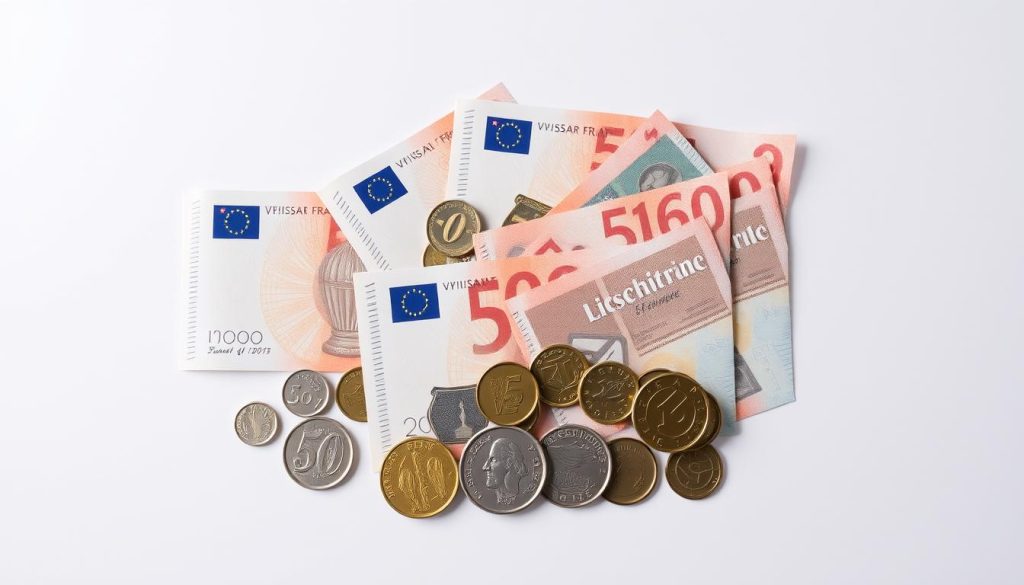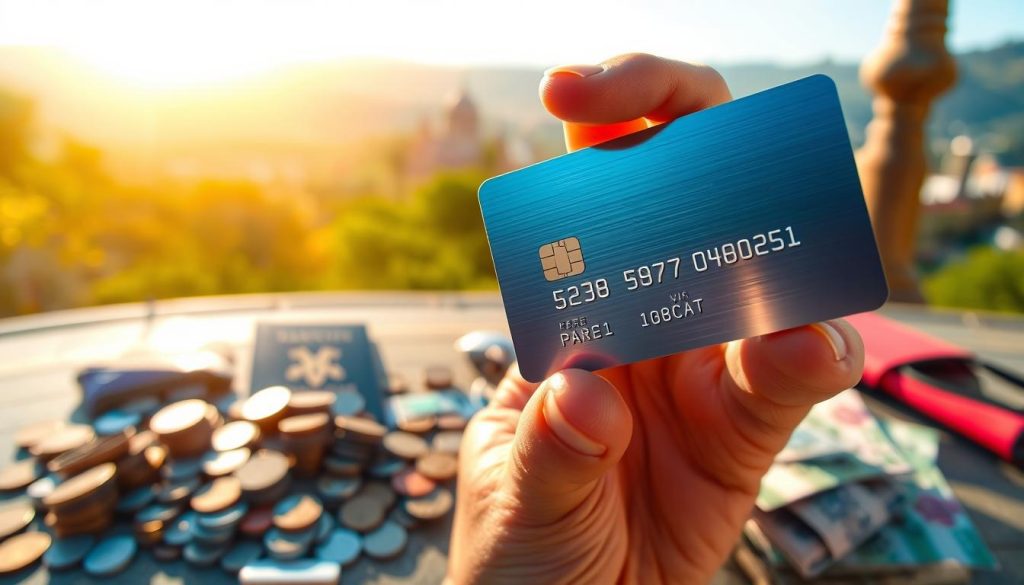Did you know that Liechtenstein, one of the smallest countries in the world, uses the Swiss franc as its official currency? Despite its size, this alpine destination offers a seamless experience for visitors when it comes to managing money. Whether you’re exploring its charming towns or hitting the ski slopes, understanding the local financial system can make your trip smoother.
In many places, the euro is also accepted, giving you flexibility during your stay. This dual-currency approach makes it easier for travelers to navigate daily transactions without hassle. From dining in cozy restaurants to booking train tickets, knowing your options ensures a stress-free experience.
This guide will help you understand the basics of handling money in this unique country. You’ll learn about exchange rates, banking practices, and tips for making the most of your budget. Whether you’re planning a winter ski trip or a summer hiking adventure, being prepared with the right currency will enhance your journey.
Understanding Liechtenstein’s Currency Landscape
This small yet prosperous country offers a unique dual-currency experience for visitors. Whether you’re exploring its charming towns or enjoying winter sports, knowing how to handle money here is essential. The official currency is the Swiss franc, known for its stability and reliability.

The Swiss Franc Advantage
The Swiss franc is deeply embedded in the country’s financial system. It’s widely accepted in hotels, restaurants, and shops. Using this currency ensures you get the best rates and avoid unnecessary fees. Many locals prefer it for its consistency, especially in daily transactions.
Acceptance of Euros in Daily Transactions
While the Swiss franc is the official currency, euros are also commonly accepted in many places. This is particularly helpful for travelers coming from eurozone countries. However, keep in mind that change is often given in Swiss francs, so it’s good to have both currencies on hand.
Here’s a quick breakdown of where you can use euros:
- Most restaurants and cafes in tourist areas.
- Popular attractions like museums and castles.
- Public transport, including buses and trains.
Understanding this dual-currency system can make your trip smoother. Whether you’re hiking in the summer or skiing in the winter, being prepared with the right money ensures a stress-free experience.
Managing Payments on Your Liechtenstein Trip
Handling payments during your stay in this charming country is simple and convenient. Whether you’re exploring the mountains or enjoying winter sports, knowing your options ensures a smooth experience. Credit and debit cards are widely accepted, making them a reliable choice for most transactions.
Why Use Credit and Debit Cards?
Cards like VISA and Mastercard are accepted in most hotels, restaurants, and shops. They offer convenience and security, especially in busy tourist areas. Using cards also helps you avoid carrying large amounts of cash.
For ATM withdrawals, cards linked to major banks work seamlessly. However, check with your bank about foreign transaction fees. Some cards, like the Chase Sapphire Preferred, offer no foreign exchange fees, saving you money.
Tips for Safe and Cost-Effective Card Usage
Here are some practical tips to make the most of your card usage:
- Always choose to pay in the local currency (Swiss franc) to avoid unfavorable conversion rates.
- Keep an eye on daily withdrawal limits to ensure you have enough cash for your activities.
- Use RFID-blocking wallets to protect your cards from skimming incidents.
By following these tips, you can enjoy a hassle-free payment experience during your trip.
| Payment Method | Where Accepted | Tips |
|---|---|---|
| Credit Cards | Hotels, restaurants, shops | Check for foreign transaction fees |
| Debit Cards | ATMs, stores | Use local currency for withdrawals |
| Cash | Small shops, buses | Carry small denominations |
Optimizing Your Payment Methods at Home and Abroad
Planning your finances for a trip abroad? Prepaid travel cards can simplify your money management. These cards are designed to make your travel experience smoother, whether you’re exploring a bustling city or hiking in the mountains.
Prepaid cards are a secure and cost-effective way to handle expenses. They allow you to load multiple currencies, including the Swiss franc, making them ideal for international trips. Plus, they help you avoid hidden fees tied to currency conversion.

How Prepaid Travel Cards Work
Prepaid travel cards function like debit cards but are preloaded with a set amount of money. You can use them for purchases, ATM withdrawals, and even online bookings. They’re accepted in most hotels, restaurants, and shops worldwide.
One of the biggest advantages is their multi-currency feature. You can load currencies like the Swiss franc, euro, or USD, depending on your destination. This flexibility ensures you’re always prepared, whether you’re skiing in the winter or biking in the summer.
Choosing the Right Prepaid Card
When selecting a prepaid card, compare providers like Revolut and Wise. Look for low fees, competitive exchange rates, and ease of use. Some cards even offer additional perks, like travel insurance or discounts on activities.
Here are a few tips to help you choose:
- Check for foreign transaction fees and ATM withdrawal limits.
- Ensure the card supports the currencies you’ll need, such as the Swiss franc.
- Read reviews to find a card with reliable customer service.
By using a prepaid travel card, you can save money and enjoy a stress-free trip. It’s a smart way to manage your finances, whether you’re traveling for a day or a month.
Liechtenstein: Ultimate Travelers Guide to Currencies & Payments
Keeping an eye on exchange rates can save you money during your travels. Whether you’re exploring a bustling city or hiking in the mountains, understanding how to track live rates ensures you get the best value for your money.
![]()
Tracking Live Swiss Franc Exchange Rates
Real-time tools like Monito make it easy to monitor the Swiss franc’s value. These platforms provide up-to-date information, helping you decide the best time to exchange your currency. For example, if the rate drops, you can save significantly on larger transactions.
Monitoring rates is especially useful for budget-conscious travelers. It allows you to plan your spending and avoid unexpected costs. Whether you’re booking a hotel or dining at a restaurant, staying informed ensures you make the most of your trip.
Avoiding Hidden Foreign Transaction Fees
Hidden fees can quickly add up, especially when using credit or debit cards abroad. Always check your card’s foreign transaction fees before making purchases. Some cards, like those from Revolut or Wise, offer low or no fees, making them ideal for international travel.
Another tip is to pay in the local currency. This avoids unfavorable conversion rates charged by merchants. For instance, if you’re buying a train ticket or renting a bike, choose Swiss francs over your home currency.
By following these strategies, you can enjoy a smoother and more cost-effective travel experience. Being prepared with the right tools and knowledge ensures you stay in control of your finances.
Sending Money to Liechtenstein: A Step-by-Step Overview
Sending money to this small yet vibrant country is easier than you might think. Whether you’re supporting family, paying for services, or funding a trip, understanding your options ensures a smooth process. This guide will walk you through the best ways to transfer funds securely and cost-effectively.

International Money Transfer Solutions
When sending money internationally, you have several options. Traditional banks often charge high fees, but digital platforms like Wise and Revolut offer competitive rates. These services are designed to make transfers quick and affordable.
For example, Wise allows you to send money to over 70 countries, including Liechtenstein, with minimal fees. Revolut, on the other hand, offers fee-free transfers for bank deposits. Both platforms provide real-time exchange rates, ensuring you get the best value for your money.
Comparing Provider Fees and Rates
Not all money transfer services are created equal. Traditional banks may charge up to $50 for international wire transfers, while digital providers like Wise and Revolut keep costs low. Here’s a quick comparison:
| Provider | Transfer Fee | Exchange Rate Markup | Transfer Speed |
|---|---|---|---|
| Wise | $10.72 | 0% | Instant |
| Revolut | $0 | 0.2% | 1-2 days |
| Bank Transfer | $35-$50 | 1-3% | 1-5 days |
For large transfers over $10,000, Wise is often the best choice due to its competitive pricing and strong customer service. Revolut, meanwhile, is ideal for smaller, fee-free transfers.
By comparing providers, you can save money and ensure your funds arrive quickly. Always check for hidden fees and choose the option that best fits your needs.
Currency Exchange Rates and Economic Considerations
Understanding currency exchange rates can make your travels more cost-effective. The Swiss franc, like any other currency, is influenced by global economic factors. These fluctuations can impact your budget, so knowing how to navigate them is essential.
Understanding the Fluctuations in the Swiss Franc
Several factors affect the Swiss franc’s exchange rate. Economic indicators like inflation, interest rates, and trade balances play a significant role. For instance, higher interest rates in a country can attract foreign investment, increasing demand for its currency.
Global market conditions also influence the franc. During times of economic uncertainty, the Swiss franc often strengthens due to its reputation as a “safe-haven” currency. This means it’s seen as a stable investment during turbulent periods.
Here’s a breakdown of key factors:
- Inflation: High inflation can weaken a currency’s value.
- Interest Rates: Higher rates attract foreign investors.
- Trade Balances: A surplus increases demand for the currency.
Monitoring Exchange Rates for Better Budgeting
Tracking exchange rates helps you make informed decisions. Tools like Monito provide real-time updates, allowing you to exchange money at the best time. For example, if the Swiss franc weakens against your home currency, you’ll get more value for your money.
Here’s a quick guide to effective rate tracking:
| Tool | Feature | Benefit |
|---|---|---|
| Monito | Real-time updates | Helps you time exchanges |
| Wise | Mid-market rates | Offers fair conversion rates |
| Revolut | Multi-currency support | Simplifies international transactions |
By staying informed, you can save money and plan your travel budget more effectively. Whether you’re visiting for a day or a month, understanding these dynamics ensures a smoother experience.
Travel Financial Tips and Best Practices
Managing your finances while traveling can make or break your trip. Whether you’re exploring a new country or revisiting a favorite destination, having a solid plan ensures you stay within budget and enjoy every moment.
Budgeting for Your Trip
Creating a realistic budget is the first step to a stress-free journey. Start by estimating costs for accommodations, meals, and attractions. For example, a mid-range hotel in this country might cost around $100 per night, while a meal at a local restaurant averages $20-$30.
Here’s a quick breakdown of daily expenses:
- Accommodation: $80-$150 per night
- Meals: $30-$50 per day
- Attractions: $10-$20 per activity
Seasonal factors also play a role. During the summer, prices for outdoor activities may rise, so plan accordingly. Tools like budgeting apps can help you track spending and stay on track.
Local Payment Etiquette and Tipping Customs
Understanding local customs ensures you interact respectfully with residents. In this country, tipping is not mandatory but appreciated. For example, rounding up the bill at a restaurant or leaving a small tip for excellent service is common practice.
Here’s a guide to tipping in various situations:
- Restaurants: 5-10% of the bill
- Taxi Drivers: Round up to the nearest dollar
- Hotel Staff: $1-$2 per day for housekeeping
By following these tips, you’ll navigate your trip with confidence and respect for local traditions. Whether you’re here for a day or a year, these practices will enhance your experience.
Planning Your Liechtenstein Journey
Exploring this charming country is easier when you know the best ways to get around. Whether you’re arriving by train, bus, or car, understanding your options ensures a smooth start to your adventure. This guide will help you navigate the transport system and manage your money effectively throughout your trip.
Transport Options and Getting Around
Getting around is simple with a variety of transport choices. Trains connect major cities, making them a convenient option for long-distance travel. Buses are ideal for shorter trips, with tickets starting at just 2 CHF for a single ride.
If you prefer flexibility, renting a car is a great choice. Prices start at around $40 per day, giving you the freedom to explore at your own pace. Remember to check local parking rules, especially in busy areas.
Integrating Currency Management with Your Itinerary
Managing your money wisely is key to a stress-free trip. Use a mix of cash and cards for convenience. While the Swiss franc is the official currency, euros are also accepted in many places. Always carry small denominations for bus tickets or small purchases.
Here are some tips to keep in mind:
- Withdraw cash in Swiss francs to avoid extra fees.
- Use credit cards for larger expenses like hotels or car rentals.
- Track your spending daily to stay within budget.
By combining smart transport choices with effective currency management, you’ll enjoy a seamless and memorable journey.
Conclusion
Navigating financial systems abroad can be straightforward with the right preparation. This guide has equipped you with essential tips to manage your money effectively, from understanding exchange rates to choosing the best payment methods. Whether you’re exploring a new country or revisiting a favorite destination, these strategies ensure a smooth experience.
Remember to track live exchange rates, use cards wisely, and avoid hidden fees. Planning your budget and integrating currency management into your itinerary can save you time and stress. With these insights, you’re ready to enjoy every moment of your journey.
Use this guide as your go-to resource for both planning and in-trip phases. By staying informed and prepared, you’ll make the most of your day and create lasting memories. Happy travels!
The above is subject to change.
Check back often to TRAVEL.COM for the latest travel tips and deals.







0 Comments